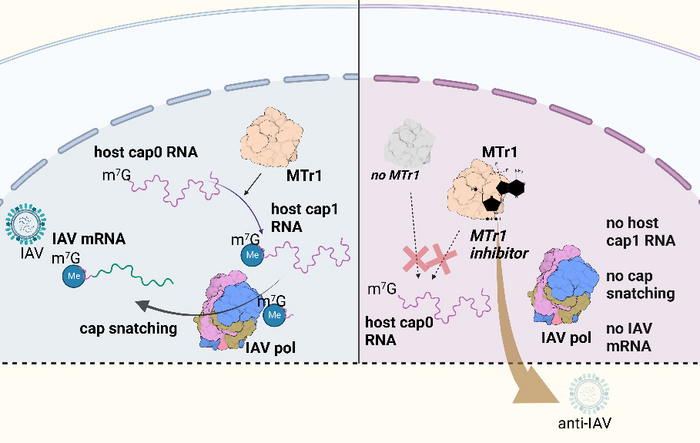Viruses use the molecular repertoire of the host cell to replicate. Researchers from the Cluster of Excellence ImmunoSensation2 at the University of Bonn, together with Japanese researchers, want to exploit this for the treatment of influenza. The team led by Prof. Hiroki Kato from the Institute of Cardiovascular Immunology at the University Hospital Bonn has identified a compound that inhibits the body’s own methyltransferase MTr1, thereby limiting the replication of influenza viruses. The compound proved effective in lung tissue preparations and mouse studies and showed synergistic effects with already approved influenza drugs. The study is now published in the journal Science.

Credit: Image (created with BioRender.com): Yuta Tsukamoto/UKB
Viruses use the molecular repertoire of the host cell to replicate. Researchers from the Cluster of Excellence ImmunoSensation2 at the University of Bonn, together with Japanese researchers, want to exploit this for the treatment of influenza. The team led by Prof. Hiroki Kato from the Institute of Cardiovascular Immunology at the University Hospital Bonn has identified a compound that inhibits the body’s own methyltransferase MTr1, thereby limiting the replication of influenza viruses. The compound proved effective in lung tissue preparations and mouse studies and showed synergistic effects with already approved influenza drugs. The study is now published in the journal Science.
To replicate, viruses need a host cell. There they introduce their genetic information in the form of the nucleic acids DNA or RNA. These molecular blueprints are used in the host cell to produce new viruses. In order to distinguish foreign from its own nucleic acids, the cell uses a kind of labeling system. Own RNA, for example, is tagged with a molecular cap that identifies it as non-hazardous. This enables the immune system to react specifically to threats.
The stolen cap
The molecular cap is a methylated nucleoside: A small molecule attached to the end of the RNA chain. Tagged in this way, the RNA does not trigger an immune response. However, if there is RNA in the cell that lacks the cap structure, it is recognized by the immune receptor RIG-I, and the immune system is alerted. To escape this, influenza viruses have developed a special mechanism. They steal the molecular cap from cellular RNA molecules and transfer it to their own RNA. This process is called cap-snatching.
Influenza requires cellular enzyme for replication
The enzyme MTr1 provides cellular mRNA with a cap structure and thus functions as the cell’s “nucleic acid labeler”. The team led by Prof. Hiroki Kato of the Institute of Cardiovascular Immunology at the University Hospital Bonn has now been able to show how much influenza viruses depend on the function of the enzyme MTr1. “While other viruses, such as SARS-CoV-2, are able to cap their RNA molecules on their own, influenza viruses rely on stealing existing caps,” says Yuta Tsukamoto, lead author of the paper. “If the function of MTr1 is disrupted in the cell, there are no caps available to transfer to viral RNA.” The activity of MTr1 is thus essential for the replication of the influenza virus in the cell.
New inhibitor inhibits virus replication
The researchers want to harness this dependence for the treatment of influenza infections. To this end, they searched for inhibitors that specifically inhibit MTr1. The team investigated how the substances in the infected tissue affect the amount of virus particles produced. The researchers tested this both in mouse models and in human lung tissue preparations. These so-called lung explants come from patients who have undergone lung surgery. “Among thousands of candidates, we were able to identify a molecule that inhibits MTr1 in human lung explants and also in vivo in mice, curtailing influenza replication,” reports Prof. Hiroki Kato, a member of the Cluster of Excellence ImmunoSensation2 at the University of Bonn.
The inhibitor is a derivative of a natural product called trifluoromethyl tubercidin (TFMT), which is produced by bacteria of the genus Streptomyces. “We hope this study will lead to the development of new treatments for influenza,” says Prof. Hiroki Kato. In the present study, the researchers were already able to demonstrate that TFMT works together with approved drugs against influenza infections. It was even possible to show a clear synergistic effect with regard to the number of virus particles produced in the tissue.
Participating institutions and funding:
In addition to the University of Bonn and the University Hospital Bonn, the study involved Hokkaido University (Japan), the National Institute of Infectious Diseases Tokyo (Japan), the National Institute of Advanced Industrial Science and Technology Tokyo (Japan), the University of Tsukuba (Japan), Aarhus University (Denmark), Academia Sinica Taipei (Taiwan) as well as the Universities of Münster, Marburg and Freiburg, the Technical University of Munich and the German Center for Infection Research (DZIF). The work was supported by the German Research Foundation (DFG) and the Japan Society for the Promotion of Science (JSPS).
Publication: Yuta Tsukamoto et. al.: Inhibition of cellular RNA methyltransferase abrogates influenza virus capping and replication, DOI: https://www.science.org/doi/10.1126/science.add0875
Media contact:
Dr. David Fußhöller
Cluster of Excellence ImmunoSensation2
University of Bonn
Tel. +49 (0)228 287 512 83
E-Mail: [email protected]
Journal
Science
DOI
10.1126/science.add0875
Method of Research
Experimental study
Subject of Research
Human tissue samples
Article Title
Inhibition of cellular RNA methyltransferase abrogates influenza virus capping and replication.
Article Publication Date
9-Feb-2023




